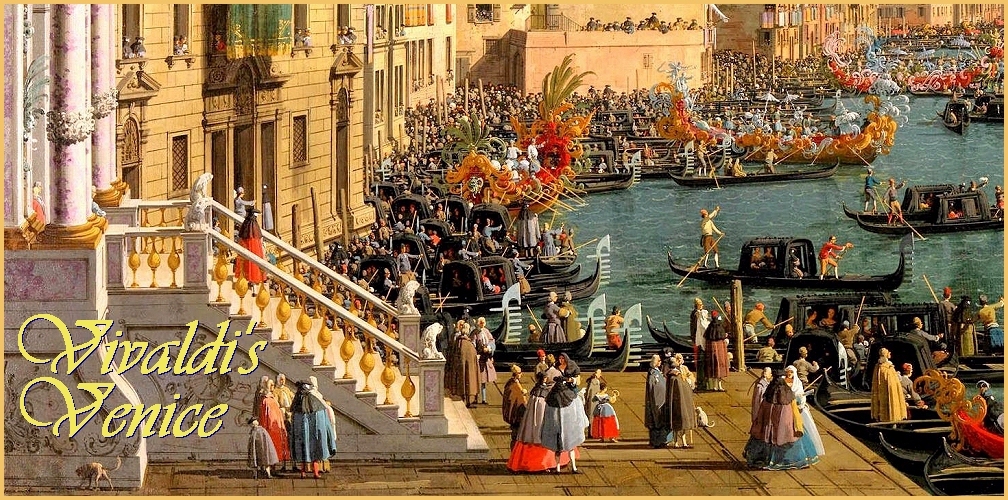 Reviewed by Ewart Shaw, Saturday 19th May 2018.
Reviewed by Ewart Shaw, Saturday 19th May 2018.
Antonio Lucio Vivaldi as you've never heard him before was the promise and, while I've heard a lot of Vivaldi performed on authentic instruments with regard to the performing practices of his day, I hadn't heard him played by a local ensemble of players versed in Baroque performance, to this standard, and I certainly hope to hear the
Adelaide Baroque Orchestra again, and regularly.
Adelaide is a UNESCO city of music and home to one of the world's most influential arts festivals and as I sat in the Elder Hall, I thought "yes, we should have a baroque orchestra, and this is an impressive beginning".
There are the expected strings, probably with some strung with gut, a violone, elder brother to the 'cello, and some properly ligneous woodwind, and a harpsichord. The sound from the stage is softer than it would be from an ensemble of contemporary instruments, but engaging, and drawing the listener in by the ears.
It's frequently alleged that Vivaldi wrote not four hundred concerti but the same concerto four hundred times. Certainly, his style is instantly recognizable, and the three-movement form, frequently allegro/largo/allegro, forming an inescapable template, within those constraints he explores rhythms, melodies, and instrumental textures, rendering each work individual and enjoyable.
There were seven concerti on the program, and the sinfonia to his opera
L'Olympiade, also in the traditional three-part model. The majority of the works featured oboes, recorders, and violins in the principal roles. It turns out that oboe playing was a core skill taught at the Ospedale della Pieta, where Vivaldi was master of music, and the demands of providing fresh material for the orphan girls gave him the opportunity to explore sonorities and instrumental combinations.
The orchestra was led by Italian master, Davide Monti, whose baroque performance credentials are impeccable. The programme makes note that he likes to speak with his violin, a Guadagnini dated 1766, and he's particularly elegant in his communications, pacing and pouncing across the stage, encouraging his players. They have been drawn from Adelaide's own pool of baroque enthusiasts, with others from across the country, and their CVs in the programme is a rollcall of Baroque ensemble playing.
The playing from everyone was committed and enjoyable. Two of the concerti featured the full line up, one in D minor and one in G minor, written for the court orchestra in Dresden. Others explored various combinations of solo instruments against the full strings or the basso continuo.
It was great to hear Linton Rivers, one of the stalwarts of Adelaide baroque, playing the recorder. His commitment to the music of the period, and the instrument deserves more recognition. Elsewhere, Monti directed a splendid performance of the most well known (only well known?) item in the program, the
Violin Concerto no.4 in F minor (1721) RV 297 L'inverno, Winter from the Four Seasons. He prefaced each movement with the words of the original poem in Italian but did the real communication, as indeed throughout, via his violin. The
G minor Concerto, for 'cello, strings, and basso continuo, showcased Anthony Albrecht, who recently took his instrument across Australia in a lengthy concert tour. His impeccable playing was a delight and the slow movement was especially impressive, with his line spinning out against the slightly spooky accompaniment.
The Four Seasons, four of the twelve concerti in Il Cimento dell'Armonia e dell Inventione, were probably the first of his concerti to be known to the general public, and most probably through the recording by I Musici. It was delightful to hear it in the context of Vivaldi's oeuvre.
There was one eccentric component to the entertainment. Charles Southwood, a former ABC Classic FM presenter, prefaced each work with a brief quote, either from Vivaldi's biography, his birth evidently triggered an earthquake, or from Robert Dessaix's Night Letters. Strange, but there it was.
There are lots more Vivaldi concerti to listen for, and his vocal music contains more joys than the famous Gloria, performed in Elder Hall later that day, and then there are the operas to look forward to.
For over forty years, Adelaide Baroque has presented music of the period with small groups and has now taken the very audacious step of establishing an orchestral ensemble. It is an ambition that deserves support. Check out their website for more details, especially for their Baroque exploration series in the Tynte Street Baptist Church throughout the year.
Reader Reviews
To post a comment, you must
register and
login.
 Reviewed by Ewart Shaw, Saturday 19th May 2018.
Reviewed by Ewart Shaw, Saturday 19th May 2018. Reviewed by Ewart Shaw, Saturday 19th May 2018.
Reviewed by Ewart Shaw, Saturday 19th May 2018.